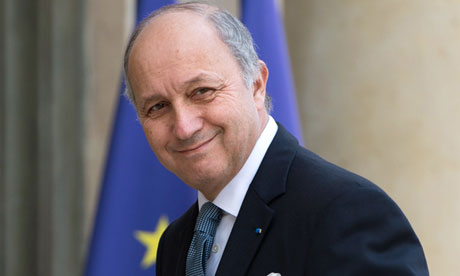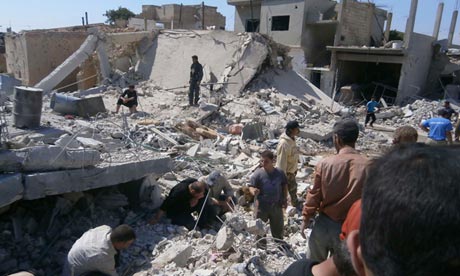Medics working in six rebel-held districts near Damascus have treated several hundred fighters for symptoms of chemical exposure since March, a detailed investigation has found, adding fresh impetus to claims the Syrian regime has resorted to the banned weapons.
A reporter from the French newspaper Le Monde who spent two months with rebel groups on the edge of the Syrian capital claims to have witnessed chemical attacks and to have seen numerous victims at various stages of exposure.
The first-hand account, which includes interviews with medics, rebel leaders and patients, is the most-detailed yet among a range of claims that suggest chemicals and or gases have been used on numerous Syrian battlefields.
The report was immediately seized on by the French foreign minister, Laurent Fabius, who on Monday said: "There is increasingly strong evidence of localised use of chemical weapons [in Syria]. That must all be verified. We are consulting with our partners to see what concrete consequences that we are going to draw from this."
Britain, the US and Israel have also alleged to have evidence of chemical use. Le Monde blames regime forces for their use. That assessment is shared by all three countries, whose officials say they are still studying earlier findings, which have been based on blood and soil samples taken from the site of the alleged attacks.
Le Monde's account is supported by video of apparent victims being treated and reports of a dispensing device – a 20cm cylinder that allegedly releases a gas soon after hitting the ground.
 The French foreign minister, Laurent Fabius, says there is strong evidence of localised use of chemical weapons in Syria. Photograph: Bertrand Langlois/AFP/Getty
The French foreign minister, Laurent Fabius, says there is strong evidence of localised use of chemical weapons in Syria. Photograph: Bertrand Langlois/AFP/GettyBarack Obama last year said that proven use of Bashar al-Assad regime's large stockpiles of chemical weapons, which include sarin and mustard gas, would change the US response to the violence in Syria. Obama has shifted uncomfortably since the first allegations of chemical use were levelled at Damascus. The US position has so far been to resist calls to become directly involved in Syria, instead indirectly backing efforts by allies Qatar and Saudi Arabia to support some rebel groups.
Regime officials had blamed rebel groups for an alleged chemical attack in Khan al-Assel, an Aleppo suburb, in March and demanded a UN inquiry into the incident. The UN agreed and formed a taskforce, which it insisted should also investigate other alleged attacks, particularly around Damascus. The investigators, led by Swedish weapons expert, Åke Sellström, have not been allowed into Syria and have since been examining evidence collected by intelligence agencies, including MI6.
Sellström has visited the UK three times since the inquiry was launched in March and analysed the samples collected by British intelligence, including blood samples from victims. He has also visited US facilities and looked at separate samples collected by the CIA, said a UK official.
The official acknowledged the standard of proof required by the Sellström investigation would probably require inspectors to visit Syria, but that he has so far not been able to agree the terms with Damascus.
"We are really in the realm of speculation on why Assad is risking the use of chemical weapons," the official said. "It possible that local commanders are finding it an effective tactical weapon to clear whole areas of rebels without much international response."
Western officials believe military commanders would use such weapons without direction from senior regime officials. They assess that the alleged attacks are small in scale and fit no regular pattern.
"They are testing boundaries, calling our bluff," said one diplomat. "So far they have called it successfully."
 The battle for Qusair, near Homs, is one of the most crucial. Photograph: Reuters
The battle for Qusair, near Homs, is one of the most crucial. Photograph: ReutersMeanwhile, elsewhere in Syria the battle for Qusair near the border with Lebanon continued to rage on Monday, with Hezbollah forces advancing slowly from the south, but continuing to take heavy casualties. Officials close to the Islamic Dawa party in Lebanon suggested to Lebanese media that between 79-110 Hezbollah militants had been killed in Qusair in the past eight days.
Syrian regime forces are stationed to the north and east of the city, which is on the strategically vital road between Damascus and Homs, and are also moving slowly towards the centre. Rebel reinforcements are trying to reach Qusair from Aleppo and Idlib, led mainly by the Liwa al-Tawheed Brigade, whose commander, Haji Mara, is spearheading a resupply effort.
The battle for Qusair is one of the most crucial yet in Syria's civil war, which is now into its third year. A regime victory would deny rebel groups a vital supply line to Lebanon. A rebel win would cut off the regime supply line from Homs to Damascus.
Hezbollah's now public role in Syria has sharply heightened sectarian tensions in Lebanon. A mortar was fired from southern Lebanon into Israel early on Monday, one day after two rockets hit a Shia suburb of south Beirut
















Comments About This Article
Please fill the fields below.